SARA TAVARES / “Guisa”
There is a big, big generation of Cape Verdeans and other Africans here in Lisbon, in Paris, in Boston, all over… with a kind of messed-up identity. Our generation feels very lost because there is no culture specifically for us; that talks about our reality.
When I walk around with my friends, it’s a very, very interesting community. We speak Portuguese slang, Angolan slang, some words in Cape Verdean Crioulo, and of course some English. In Crioulo there are already English and French words. This is because slaves from all over the world had to communicate and didn’t speak the same languages. We are a metisse culture.
The whole album is like little lullabies to myself. All the messages are about self-esteem, loving yourself. About liking what is different in you. About integrating all the parts of you.
I want to be a part of a movement like the African Americans were, like the African Brazilians were. Instead of doing the music of their ancestors, they have created this musical identity of their own. And it is now respected. It is considered whole and authentic and genuine. It will be a long time before the people from my generation do not have to choose between being African or European. I think you shouldn’t have to choose. You should just be there. Celebrate that. Be that!
—Sara Tavares
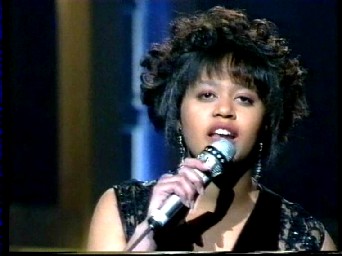
When she was 16, Sara won major television musical contests in Portugal, where she was born of Cape Verdean parents. She seemed destined for stardom, but her metoric rise was no smooth path upward. There were issues. She was an African child abandoned by her birth parents, reared by a Portuguese woman in a European culture. It is little wonder than in her search for wholeness, she latched on to what was both Black and popular, i.e. African American music.
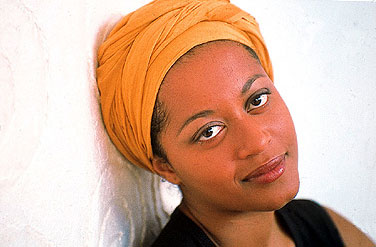
Her first album, Sara Tavares & Shout, is an admirable mixture of gospel and funk; calls to Jesus and funky backbeats that exhort one to dance. I’ve chosen two tracks, one, "Deus Ajude A Todos," a Portuguese-language cover of “Heaven Help Us All” and the other a barn-burner called “Fix Me Jesus.” Both songs display the power of Sara’s pipes. If this whole album had been in English, one would not have been able to tell that this person was not a native African American (as opposed to an acculturated African American, which is what Sara was at that point in terms of her music tastes and expressions). Clearly Sara could have continued in this direction, but she chose to explore her own roots, so rather than looking across the Atlantic, she looked southward down the coast to her parents’ home in Cape Verde.
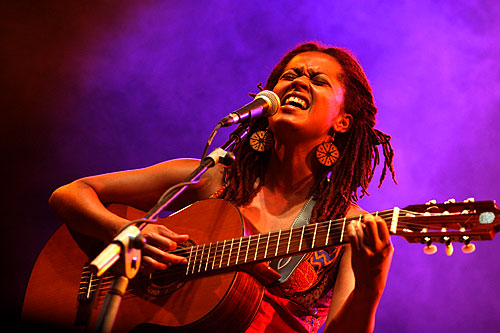
The second album, 1998’s Mi Ma Bo, went gold in Portugal and seemed to cement Sara’s status as a fledgling superstar. All the gospel is gone. The funk has been toned completely down to a simmer. The lead producer is Paris-based Lokua Kanza who brings a modern African pop sound complete with electronic keyboards. Also, most of the songs are collaborations between Sara, her manager of that period, Ani Fonseca, and Kanza. The album is a mixed bag of fully composed songs, and song fragments or simple, folk-like refrains, plus, a couple of obligatory “Soul” tunes. The funky, little love song “Mi Ma Bo” (You And Me) attracts major attention. To see a video excerpt of Sara performing “Mi Ma Bo” in 2001, click here.
Sarah has an awesomely beautiful voice. It is not hyperbole to refer to her voice as angelic. As a showcase for her wonderful instrument, the album is a delight, but Sara is also clearly searching for something. It would be easy to say, a search for roots, but there is a deeper truth. Although it is undoubtedly true that finding one’s traditional roots is important, there is an even more critical quest: the search for meaning, for relevance, a search that includes digging ones roots but also requires making an assessment of which way to go forward, what responsibilities to shoulder, what community to identify with and uplift.
On Mi Ma Bo Sarah is all over the place, one moment singing a Soul song, the next a fragment modeled on traditional folk songs of Cape Verde. Moreover, each element remains distinct, and thus there is not yet a unified whole, not yet a spot in which each part fits comfortably beside the other. Or at least that’s the way I read this fascinating (although sometimes inconsistent) document. And then there is the little problem that the album when gold.
Gold! Problem? It was on BMG-RCA, a major label. And for sure they wanted another gold record, except they surely hoped that the next one would sell more than the last one. So, at the point where she was expected to zoom onwards and upwards, Sara drops out. Instead of an immediate second helping, Sara declines to produce a quick follow-up. In fact, her next album would not be for five years, which in the music business, is sort of like two and a half lifetimes for an ingénue.
In the interim she does two guest spots on a live recording by one of the most popular Portuguese groups. “Solta-Se O Beijo,” one of her two features, not only becomes a hit, it also is the title of the album by Ala Dos Namorados. The song has a strong Cuban flavor and is a dance floor favorite, all of which undoubtedly put more pressure on Sara, pressure which she may have ignored, but pressure that was nonetheless palpable.
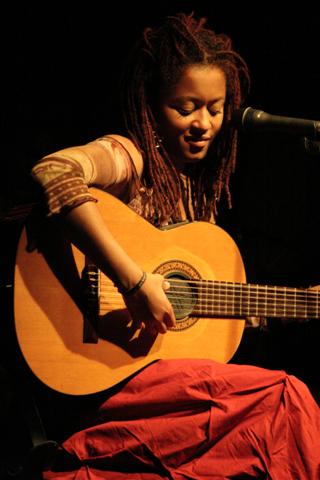
So when Sara does come out with Balance, her third release, it’s on an independent label and it’s an acoustic set full of ballads and mid-tempo songs. It’s produced by Sara and she wrote or co-wrote all of the music, plus plays percussion and miscellaneous instruments in addition to her guitar work. This is not what BMG would have wanted.
Released November 2005 in Portugal and in late February worldwide, the album sells well—and not just to Sara’s hardcore fans. It’s a top seller on European i-tunes. Rather than gush effusively about how good the album is, I will restrain myself and just make a few points.
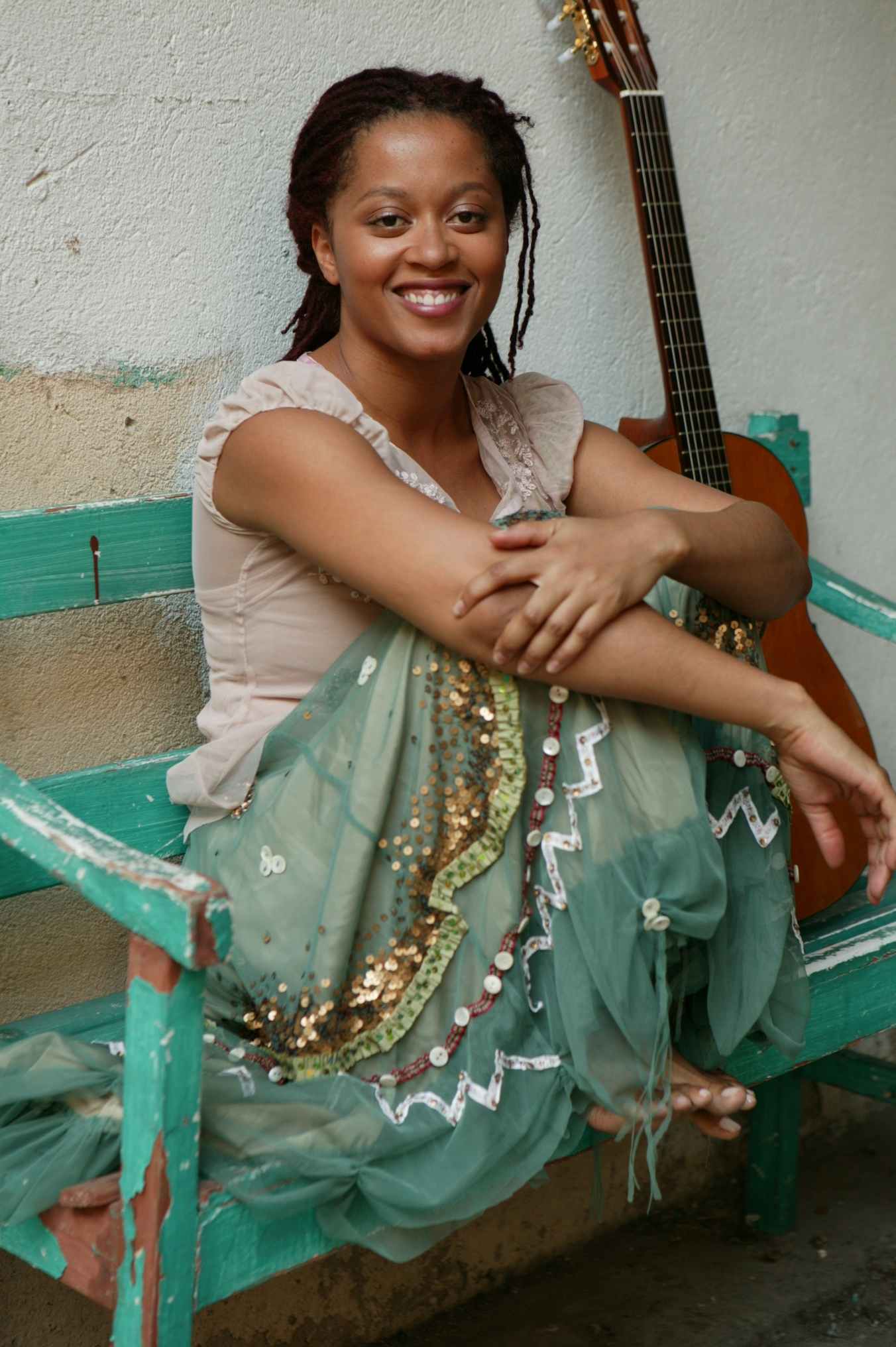
Sarah has found a way to integrate her roots-search into one sound that mixes not only African and African American influences, but also Brazilian and European elements. She no longer could be mistaken for a Soul singer or even a traditional Africanist.
There is something of all the diverse elements swimming through her music. Although this easily could have been a goulash of indistinguishable origins, instead Sara has prepared a gumbo within which each ingredient retains its distinctiveness even as the whole of it is made more tasty by the mix of the different ingredients.
Exemplary of this recipe is the song “Muna Xeia,” whose very title is a mixture. Translated as “full moon,” the word “muna” is actually a mixture of the Portuguese “lua” and the English word “moon.” Am I hearing things or is this not also a mixture of classical (specifically Beethoven’s “Moonlight Sonata) and Soul music? And finally, Sara uses the metaphor of the moon to address her identity. “It’s a very feminine song with me talking to the women. First the woman inside of me and then the women in Africa and the women in the world. I sing, ‘Moon go in peace, moon go in faith, walk in peace, walk in faith’.” And need I add, she sings it beautifully. Here is an organic and poetic articulation of sisterhood whose beauty is enhanced and strengthened by its political implications.
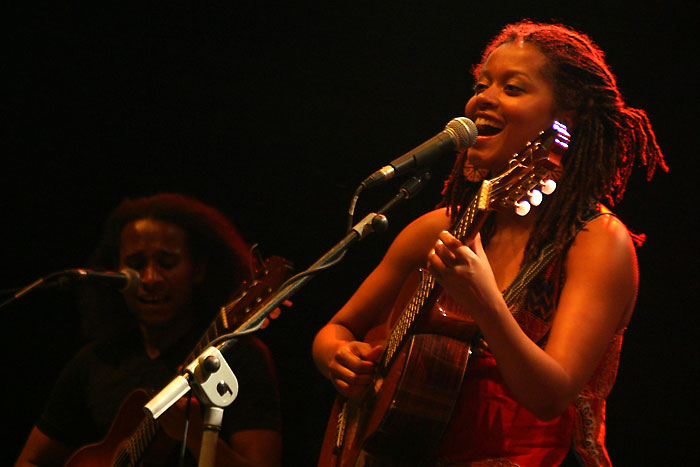
Two, she has figured out how to get down without imitating funk or rap. In fact, it is noteworthy that most of the tracks do not even have a bass on them. Gone are the programmed beats that characterized parts of Mi Ma Bo. There is not even a drum kit on many of the tracks. Nevertheless, dance is all up through here, and the rap elements are also here, but transformed. The title song best exemplifies this as she mixes a plethora of dance styles into one joyous albeit paradoxically gentle, jump-up.
Fortunately, Sarah has a video for "Balance." The video is available here. It is a very simple concept, warmly done in black and white. The music encompasses diverse generations, diverse nationalities, diverse dance styles, but all on the one, on the same beat. Especially alluring is how sensual Sara is in the flow of her movements, her undulating dance. She is beautiful. She is attractive. And though there is an obvious sexuality to the dances, there is none of the raw sex that is so prevalent in Black popular music today.
Like I said, I will resist the urge to go on and on about how she shapes a melody, how she scats and improvises, the clarity of her voice, etc. etc. I will just conclude with a word to the wise: check out Sara Tavares.
—Kalamu ya Salaam
Sara is the real deal
It’s immediately striking how much Sara sounds like Joy Denalane. (Vocally, I mean. Not the music as a whole.) Her phrasing, her tonality, the way she holds and bends her ad libbed notes, all of it is derived from classic Soul. I don’t know for sure, but I’m willing to bet that Sara (like Joy) grew up on Hathaway, Franklin, Wonder, Khan, Riperton, etc. Even when she’s singing in Portuguese, Sara’s vocal style is quintessential Black American Soul. I agree with Kalamu that Sara has moved past an actual ‘copying’ of Soul music, but her voice is still right there, deep in it. And this isn’t a knock in the slightest. It’s moreso an acknowledgment of what Sara herself said, that African-American music is a tradition, a tradition with recognizable methodologies.
I remember the first time Kalamu played a Joy Denalane record for me. At first, I was so fascinated by the concept of a young Afro-European singing our music (’our’ meaning ‘Black American,’ Robbert), that I could hardy hear the songs as songs. I’ve since gotten over that little block. Now, when I hear something like "Mi Ma Bo" or "Deus Ajude A Todos," I simply dig it. I dig it and wonder (as I often do) how we can live amongst such a wealth of different voices, musics and styles and still hear the same fifteen records playing over and over and over on the radio. Also (as I’m writing this, "Balance" just ended), I’m enjoying the way Sara fluently negotiates the wide variety of musical styles, and tempos, and intensities that she performs in. Anyway, it feels a little silly to say this, because even a quick skip through the jukebox makes it obvious, but yes, Kalamu’s right. Sara Tavares is the real deal.
—Mtume ya Salaam
This entry was posted on Sunday, February 26th, 2006 at 10:53 pm and is filed under Contemporary. You can follow any responses to this entry through the RSS 2.0 feed. You can leave a response, or trackback from your own site.
8 Responses to “SARA TAVARES / “Guisa””
February 27th, 2006 at 10:16 am
Okay Kalamu…you might’ve resisted the urge to go on and on about Sara…but the jukebox selection says differently. Thanks for exposing me to a limited discographyof SARA TAVARES…as in 9 of the 14 songs in the jukebos are hers. 🙂
Now that I’ve gotten that out of the way, for us folks she is a BOL in music. She is part Tracy Chapman, part Sade, part Alycia Keys, part Tina Marie…but still All SARA TAVARES. I’m saying that and I don’t even know Portuguese. I like all of the tracks that were selected. However, “Deus Ajude A Todos” and “Balance” are my favorites.
February 27th, 2006 at 1:36 pm
Kalamu,
Nice article, glad to see some of my peeps get some shine. Aquick note on some of your translations. The portuguese word for ‘moon’ is Luna, not ‘Lua’, and ‘Mi Ma Bo’ is Kriolu and difficult to translate into English, but it does not mean ‘Me and You’, literally it would be ‘me but you’ and colloquially probably more like ‘me without you’ or ‘Me not you’.
March 1st, 2006 at 9:24 pm
Hell! I don’t need to know Portugese (although I do know a little bit having gone to university in Providence, RI) I just need to get this sister’s CD ASAP. And Kalamu – I know what you’re feeling about this lady, she’s the spitting image of someone I once loved very, very much.
March 3rd, 2006 at 11:29 am
hi there
thanx gawd ya wrote a article about sara
thanx
i have two albums of her
and i saw her live once
and live she is much better
i really recommend yall to check her out
thanx again
March 16th, 2006 at 11:48 pm
Balance in nothing like Mi Ma Bo. It seems to be a bit more sincere and mellow. It was described as a cradling song for adults. It’s very personal and sincere. To some it might sound melancholic but it’s not. It’s celebratory and hopeful. Personally my favourite track is Dam Bo.
PS: Moon in Portuguese is “Lua” and not “Luna”. Luna is Spanish 😉 thought I’d add that.
Get the album!!!
June 22nd, 2006 at 2:18 am
Best CD I’ve bought in years. Sara’s Balance is a gem. I went to the record store looking for an artist by the name "Kuku". And I came out with two CD’s. Balance and Kuku’s Unexpected Pleasures. both CDs are now my music of choice either at home, on the road or in the office.
May 14th, 2007 at 4:07 am
Just had to go out and buy ‘Balance’ after listening to the title track… What a wonderful earthy Sara has. I will now have to find all her past albums. I would also love a an English translation of the lyrics on balance.
I am in love with the voice!!
June 13th, 2014 at 5:42 am
I need to disagree with one statement in your blog. “It’s immediately striking how much Sara sounds like Joy Denalane. ”
Just nje!
Leave a Reply
| top |